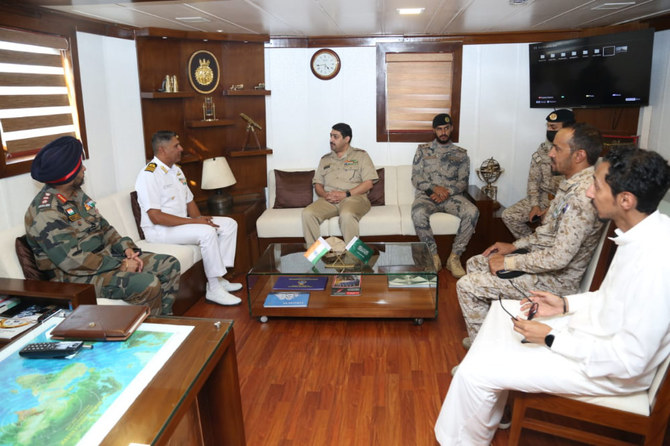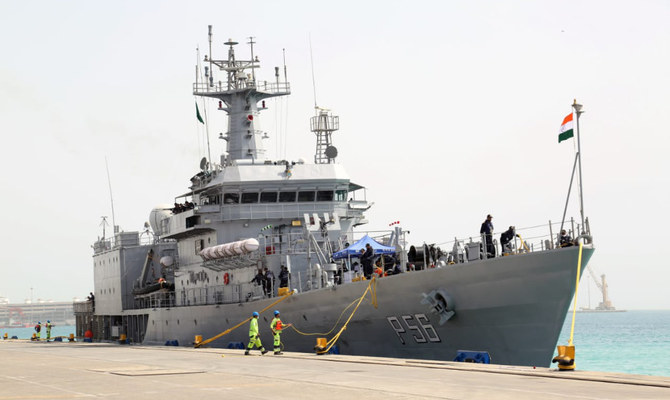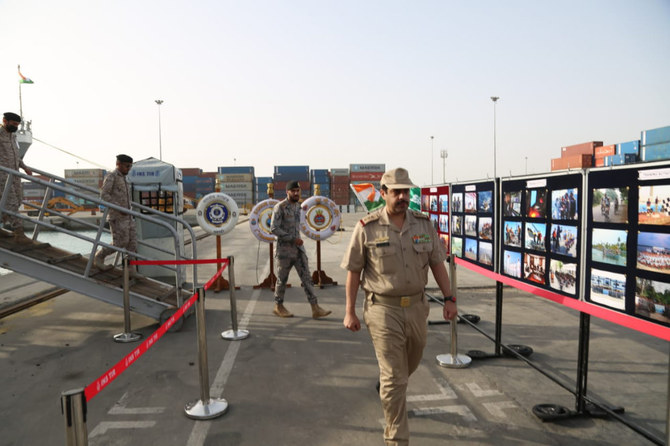JEDDAH: Vessels from the First Training Squadron of the Indian Navy — INS Tir and INS Sujata along with Indian Coast Guard ship Sarathi — arrived on Thursday at Jeddah port for a training exchange.
The exercise comes amid growing defense ties between India and Saudi Arabia.
The ships were also joined by INS Tarangini, one of the few sail training ships in the world, on Friday.
The arrival of the ships at Jeddah heralds a new chapter in bilateral defense ties after the first-ever joint naval exercise between India and the Kingdom, “Al-Mohed Al-Hind,” took place last year.
The squadron is commanded by Capt. Aftab Ahmed Khan, senior officer of the First Training Squadron and commanding officer of INS Tir.
Upon arrival at the Jeddah port, the ships were given a warm welcome by officials from the Royal Saudi Naval Forces, Border Guards and Indian Embassy.

Over the years, the ship has trained more than 4,000 officers including those from friendly foreign countries, visited 27 countries and has been a beacon of maritime diplomacy and foreign cooperation. (Supplied)
In February this year, a Royal Saudi Naval Forces delegation took part in the “Milan 2022” multi-national exercise that saw delegations from 40 countries train on India’s eastern shore.
At a Friday evening reception on INR Tir, Indian Charge d'Affaires N. Ram Prasad said the arrival of the Indian naval ships bore testimony to the growing defense ties between India and Saudi Arabia.
"The past few years have seen a tremendous growth in our bilateral relations, be it energy, trade, infrastructure development, medical research, people to people exchanges, defense cooperation and security."
India is Saudi Arabia's second largest trading partner with trade approaching $40 billion, he said.
"As we celebrate 75 years of India-Saudi Arabia diplomatic relations, we can look back with pride at the development of brotherly ties over the past several decades," said Prasad.

Over the years, the ship has trained more than 4,000 officers including those from friendly foreign countries, visited 27 countries and has been a beacon of maritime diplomacy and foreign cooperation. (Supplied)
Capt. Aftab welcomed officers of the Saudi naval forces as well as the diplomatic community and said it was a moment of pride to be in Jeddah. "We are committed to maritime security of our friendly nations," he said, and wished everyone Eid greetings.
He thanked Indian Defense Attache Col. G.S. Grewal and the Indian Missions in Riyadh and Jeddah for the grand welcome accorded to the ships.
INS Tir (meaning arrow) is the first dedicated cadet training ship to be built by Mazagon Dock Ltd. in Mumbai, and was commissioned on Feb. 21, 1986. It is the senior ship of the First Training Squadron of the Southern Naval Command and is equipped with all modern training amenities.
Over the years, the ship has trained more than 4,000 officers including those from friendly foreign countries, visited 27 countries and has been a beacon of maritime diplomacy and foreign cooperation.
The ship can carry up to 293 people on board, though her typical deployment is with 20 instructors and 120 cadets. Equipped with state-of-the-art training infrastructure, and communication and gunnery suite, the ship carries a helicopter and has also taken part in anti-piracy missions in the past.
INS Sujata is an indigenously built Sukanya-class offshore patrol vessel of the Indian Navy commissioned on Nov. 3, 1993. The ship undertakes fleet support operations, humanitarian assistance missions, offshore patrolling, ocean surveillance and escort duties. A cadet training ship for the past nine years, officer cadets are exposed to practical aspects of navigation and seamanship on the vessel before moving on to complex assignments.
The Indian Coast Guard ship Sarathi (meaning charioteer) is the third in a series of six offshore patrol vessels designed and built domestically by Goa Shipyard Ltd. Commissioned on Sept. 9, 2016, the 105-meter ship is fitted with state-of-the-art navigation and communication equipment, sensors and machineries.
Its features include 30 millimeter CRN-91 naval gun, Integrated Bridge System, Integrated Machinery Control System, Power Management System and High-Power External Fire Fighting System.
The ship is designed to carry one twin-engine light helicopter and five high-speed boats, including two quick reaction inflatable boats for swift boarding operations, search and rescue, law enforcement and maritime patrols. The ship is also capable of carrying pollution response equipment to contain oil spills at sea.

































